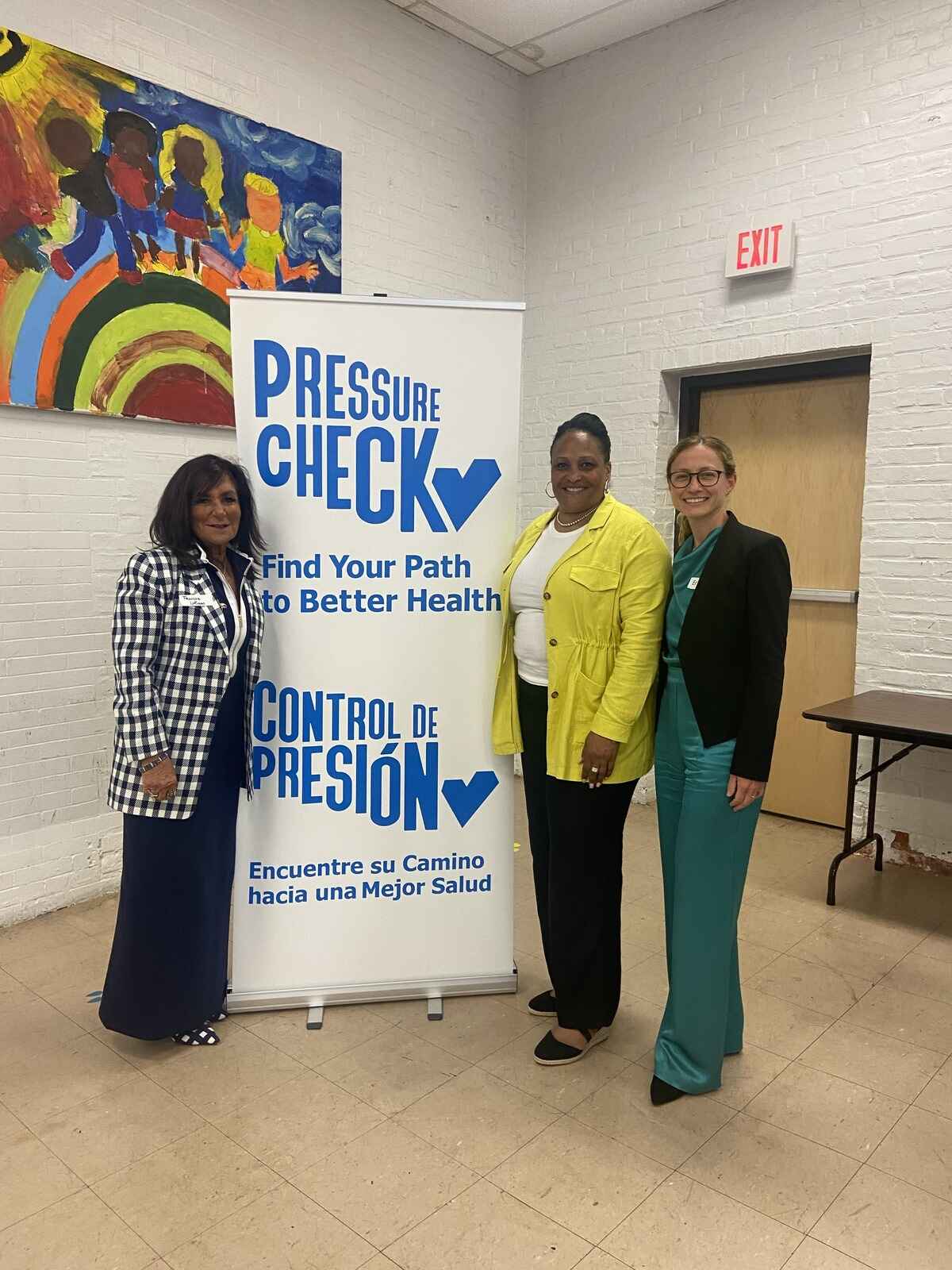
Amanda Baldwin and nursing student Alicia Clarke at a Pressure Check blood pressure screening.
A new research study spearheaded by experts at Yale School of Medicine and Yale School of Public Health is uniting clinicians with community leaders to help lower blood pressure. Funded by the Patient-Centered Outcomes Research Institute (PCORI), and supported by Yale New Haven Health, the Pressure Check Program currently has sites in New Haven, Boston, Norfolk and Houston. PCORI is a non-profit organization that funds clinical research that compares different ways of treating patients.
Pressure Check is unique in that each research site has partnered with 10 community sites each to help reach potential patients. At these sites, which include local churches and businesses, anyone can be screened for high blood pressure, and if they have high blood pressure, they can enter the program. Participants are given a blood pressure cuff to monitor their blood pressure at home and treated with one of three different methods.
The first is a referral to a primary care provider. The second model of care includes telehealth visits with a specialized blood pressure team that includes pharmacists who can help manage and adjust medications. The third model utilizes telehealth visits with a community health worker who can determine barriers to care and connect patients with the resources they need. Researchers will then follow up with patients at six, 12 and 18 months to determine whether those approaches to care helped to control their blood pressure.

“We started this as a community effort, realizing that we were not reaching people early enough in the disease course. In many cases, we were first meeting them in the hospital because they were presenting with congestive heart failure, stroke or heart attack due to high blood pressure,” said principal investigator Erica Spatz, MD, director, Preventive Cardiovascular Health Program, Yale New Haven Health Heart and Vascular Center (HVC), and associate professor of Cardiovascular Medicine at Yale School of Medicine who joined Rafael Perez-Escamilla, PhD, professor, Yale School of Public Health, to design Pressure Check with the goal of addressing disparities in blood pressure control. “High blood pressure is a silent condition. There are no signs and can go untreated for years. The impact of high blood pressure is disproportionately affecting low-income communities as well as Black and Latinx adults.”
Impacts of high blood pressure
The universal standard for high blood pressure is 130/80. Anything higher than that would be a diagnosis of hypertension, which can impact multiple organs in the body, leading to strokes, early onset dementia, heart attack and chronic kidney disease. Severe high blood pressure of 180/110 would warrant a trip to the emergency department.
The sooner high blood pressure can be treated, the better. Dr. Spatz says there are a range of options that sometimes include medications as well as lifestyle changes like a diet lower in sodium, quitting smoking and reducing stress.
“About a quarter of patients who are coming for visits with their primary care provider or cardiologist don't have their blood pressure under good control. We can do better,” said Dr. Spatz.
In addition to determining which model of care is most effective, Pressure Check is helping to unveil some of the reasons why some patients aren’t getting the care they need.
“These blood pressure screening events provide a wonderful opportunity to talk to people and hear from them about their fears, their concerns, and the things that are holding them back,” said Kathy Tucker, clinical program director, HVC Outpatient Services, Yale New Haven Hospital.
Some patients have also gotten treatment for other underlying conditions discovered through their participation.
“There was one gentleman who wasn’t feeling his best. He was having some significant pain, and he came in to be screened and he ended up getting referred to a provider for the condition that was causing the pain,” said Tucker.
Dr. Spatz says this level of care wouldn’t be possible without the dedication of those involved in the study, which not only includes cardiovascular specialists but a team of dedicated pharmacists, nurses, advanced practice nurses and community volunteers.
“High blood pressure is challenging because it's chronic. It doesn't cause symptoms. That means that people need to be attentive to it and it takes ongoing management, and we can't do that alone,” she said. “We need to do that in partnership with communities, so I hope that this is a lasting relationship that continues on into the future.”
Learn more about Pressure Check.





